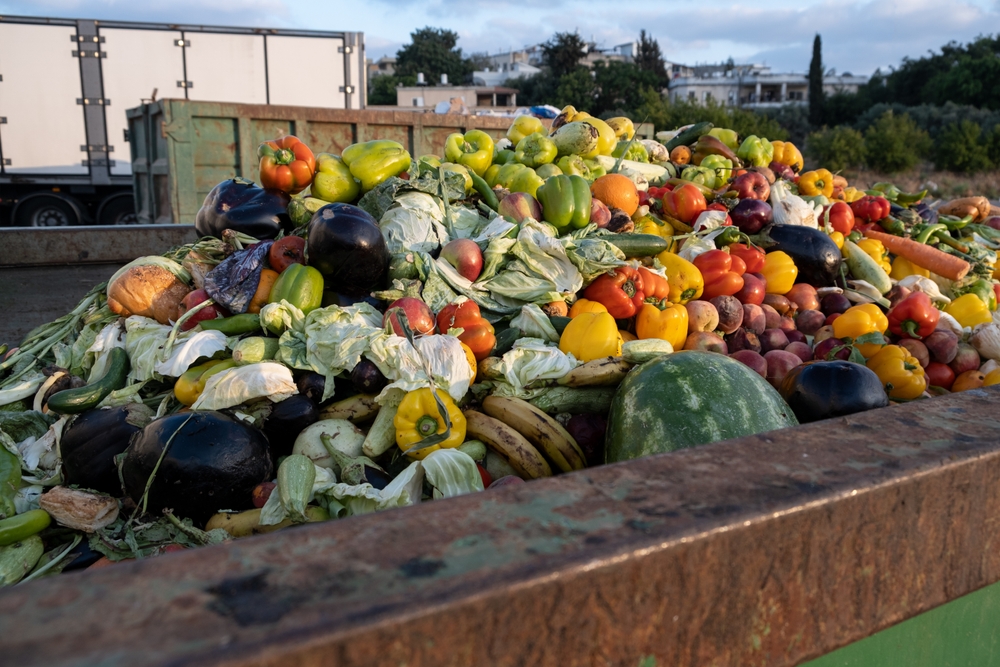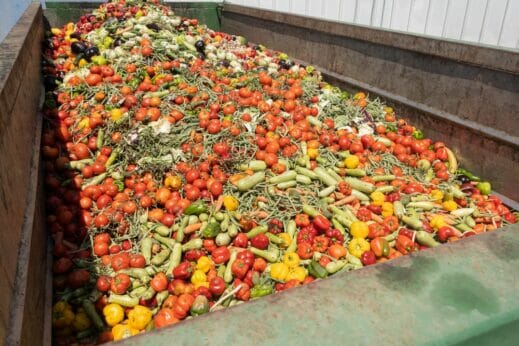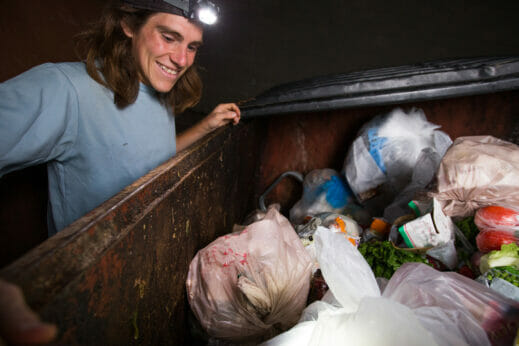Dumpster diving may sound like a way to save food and money. But for some, the risks are higher than for others.

Obscene quantities of recently baked croissants, cases of non-expired milk and pallets of still-fresh produce are relegated to the dumpsters behind grocery stores, restaurants and cafes every day, all over the world. In 2021 alone, retailers were left with 5.12 million tons of surplus food, much of which ended up in a landfill—all while 10 percent of the world’s population goes to bed hungry at night.
Humans are able to grow not just enough food but an excess of it—we produce 1.5 times the number of calories every person on earth needs to survive. But because of inefficiencies and inequities in our food system, much of that food goes to waste. From farm to table, we end up wasting about a third of our food.
As the issue of food waste became more public in the late ‘90s and early ‘00s in the midst of the Food Not Bombs movement, which recovered food waste as a protest against environmental destruction and war, some who bore witness to this inexcusable waste decided that they had to take action by incorporating this perfectly good food into their own diets. Documentaries such as The Gleaners and I, Waste Not Want Not and Dive! depicted the lengths these people, dubbed “freegans,” would go to to ensure the forgotten food they found was put to good use. But considering the fact that dumpster diving is technically illegal in many cases, the movement was overwhelmingly white—after all, people of color face a much greater risk of harassment by law enforcement and arrest.
Not everyone who feeds themselves through dumpster diving is a freegan, though; Bénédicte Boisseron, professor at the University of Michigan, Ann Arbor, who researches Black freeganism, draws a distinction between dumpstering as a practical versus political act. “The act of dumpster-diving and gleaning can be both political/ideological and practical, depending on the motivations,” writes Boisseron in an email. “Freeganism, on the other hand… connotes a sense of ideological and political commitment.” Although some people dumpster dive out of necessity, leading a freegan lifestyle is rooted in an anticapitalist ideological framework.

Photography from Shutterstock.
According to Alex Barnard, author of Freegans: Diving into the Wealth of Food Waste in America, the majority of freegans are white. “Freeganism grew out of a kind of anarchist subculture growing up around the anti-globalization movement in the ‘90s and ‘00s that itself was fairly white, and so freeganism demographics reflected that,” writes Barnard in an email. But it’s also true that freeganism is, in many ways, less accessible to people of color. “When I’m dumpster-diving, I seem to have a few more issues to deal with, as a Black male, than my white comrades,” said one Black freegan on an online forum. “They aren’t nearly as afraid of the police (or security), or threats of calling the police (or security), nor do they get harassed by law enforcement while diving to the degree that I do.”
Physical safety aside, people of color are also liable to feel the effects of food shaming more acutely than their white counterparts, says Boisseron. “When it comes to freeganism, the preconception that Blacks would dumpster dive out of necessity when Whites would do it out of concerns for the environment is the risk that many POCs will have to take if they venture into the freegan world.”
Other marginalized groups can experience challenges while dumpstering in different ways. Theresa Kadish, an educator and content creator who makes videos about dumpstering, says that, on average, she’s treated more kindly when she’s caught dumpster diving now than she was before her transition. Still, though, she recognizes that, in some contexts, dumpster diving as a trans woman could put her at increased risk of harassment, despite her personal lack of fear while dumpstering. “Yes, I am at greater risk now, and intellectually, I’m aware of that.” Considering that trans people are four times more likely than cisgender people to face violent crime, an activity like dumpster diving, which is often undertaken alone and at night, could pose an increased risk of the threat of violence. Here, too, shaming can play a role in how one’s dumpster-diving habits are received. “Lots of people say [dumpstering is] gross and disgusting, and it can kind of be in the same breath as transphobic comments.”
Ironically, poor people, who stand to gain the most by dumpstering, often have more barriers to doing so than the middle-class divers who dominate the scene. A 2014 study of urban dumpster divers in Montréal, Quebec found that time was a limiting factor for many divers. Middle-class divers with college degrees who don’t have to work full time and who don’t have children could more easily make time to dumpster dive than those with full-time and/or multiple jobs and families to support. As with other marginalized groups, poor divers in this study feared stigma more than the middle-class participants, which limited their ability to form social networks that could make dumpstering easier and more fruitful.
Is freeganism effective as a political ideology if it’s inaccessible to so many? “Freegans, while totally aware of the class/race barriers to participating in freegan practices, never really had a focused and effective strategy for overcoming them,” says Barnard via email. “There was always a contradiction (of which freegans were totally aware) that in an effort to reduce their participation in capitalism, freegans were living off the waste thrown off by capitalism,” he says. “This was always intended to be temporary—that people would create a new, alternative economy where people could provide for their needs entirely independently—but that hasn’t been successful so far.”

Photography by Shutterstock.
Perhaps dumpster diving and repurposing trashed food could contribute to a more equitable food system if it were approached in a more communal way. “If we’re thinking of a large impact on food waste and food equity, freeganism has to be rethought at a larger scale and in a collective manner,” says Boisseron. She points to the Parisian restaurant Le Freegan Pony as an example of a space in which freeganism operates on a larger scale. The restaurant uses food that can’t be sold on the market to create healthy, enjoyable meals it then serves to patrons, who can choose to make a donation of whatever amount feels right to them.
But it’s hard to deny that this kind of operation would be difficult to run on a larger scale. Food banks, for example, can’t accept wasted food. According to Diane Letson, vice president of Food Industry Partnerships for Feeding America, there are myriad reasons why food banks can’t accept food from dumpster dives. “[There’s the] dignity of the person that we’re serving, but also we’re very, very focused on food safety because we realize that some of the folks we’re serving may be struggling with compromised immune systems or may have specific dietary needs.” A lot of wasted food simply can’t re-enter the food system on a large scale in any meaningful way—only 19.5 percent of food wasted by retailers actually ends up being donated.
In the past few years, we’ve seen the advent of food waste prevention apps such as Too Good to Go, which connects people to wasted food for a small fee. Local buy-nothing groups can also serve a similar function. And some dumpster divers, like Kadish, who lives in a shared community, have stopped viewing freeganism in such political terms and rather see dumpstering as a way to feed themselves and the people immediately surrounding them. “I view it much more as a practical thing,” she says.
Despite the outrage and indignation many of us feel when we look at a dumpster full of perfectly good food, freeganism has not yet succeeded in getting meals to the people who need them most—or even people who don’t fit the white, cisgender, able-bodied, middle-class mold—on a wide scale. If anything, freeganism is reliant on the same capitalistic systems it rejects. Then again, has any way of eating adequately addressed the systemic injustices that seem so inherent in capitalism? It seems not. Freeganism may not have the ability to move the needle of food waste or food insecurity on a large scale in any meaningful way, but for those who do have the privilege to dumpster dive, sharing a free meal with someone who doesn’t have that privilege could be a step in the right direction.
As I am not deeply familiar with this issue, so I would have liked an explanation as to why restaurants and grocery stores throw out perfectly edible food. I know that for bakeries it’s a daily turnover of highly perishable food, but why are grocery stores throwing out non-expired milk and produce? Is the produce blemished, or is it a daily turnover issue as well? I’m just trying to understand why food banks or other businesses (eg. app models) can’t interject themselves into the wastestream before the food literally hits the dumpster.
How boring and tiresome. “Freegans” live off capitalism while decrying capitalism. Hypocrites much? No credibility much? Be VERY careful when dumpster diving. I don’t do it due to better life choices but don’t want anyone to get sick/die.